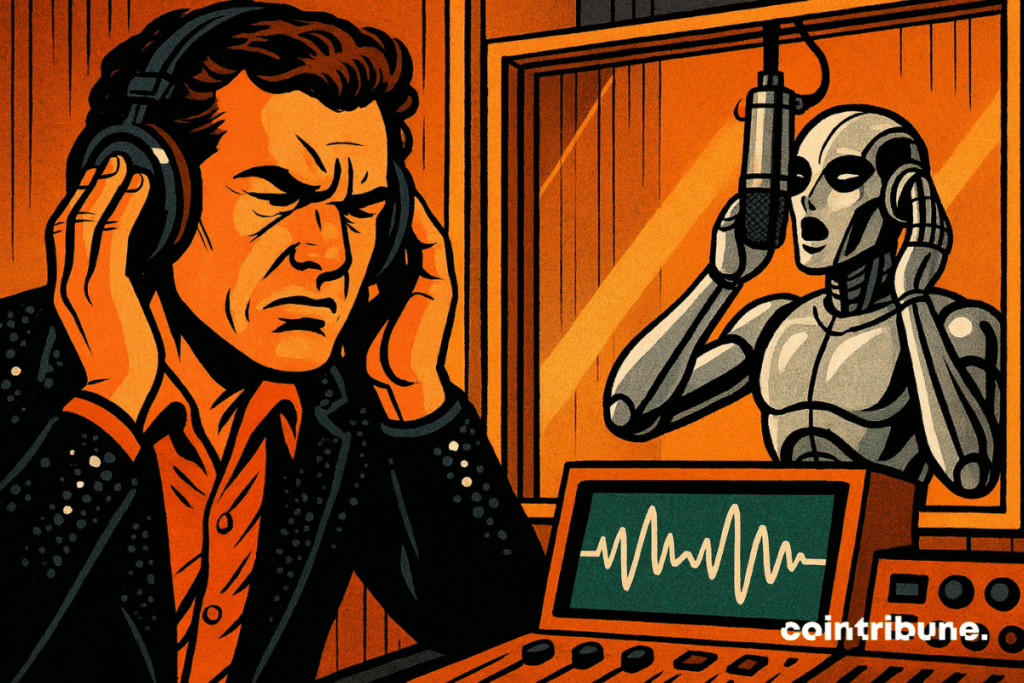Will AI Push Artists Out of the Spotlight?
Artificial intelligence has slipped into almost every field: work, health, transportation, and even our leisure. It no longer just optimizes mechanical tasks; it ventures into the world of emotions and creation. Some already fear the disappearance of entire professions, replaced by lines of code. Music, this universal language that has always belonged to humans, is now crossed by a disturbing question: what if singers lose their place to AI?

In brief
- AI already generates hits, like Heart on My Sleeve, cloning Drake and The Weeknd.
- Grimes and Killy offer their cloned voices, promising royalties to song creators.
- Timbaland launches TaTa, the first artist of a musical genre called ‘A-Pop’.
- The Grammys allow hybrid works, but reject songs entirely generated by artificial intelligence.
When AI Composes and Sings: The Temptation of Automation
AI, already at the heart of debates on American campuses, also provokes strong shocks in the music industry. Applications like Udio and Suno now allow creating a complete song in seconds. The process is simple: you type an instruction, and AI composes a melody, generates a voice, and adds lyrics.
This ease unsettles both artists and producers, who see unexpected competition arise. While the technology appeals due to its speed, it also raises a persistent worry: will we soon witness the end of pop stars as we know them?
This is how an Austrian DJ, nicknamed Butterbro, made a schlager track titled Verknallt in einen Talahon which climbed to 48th place in the German charts in 2024. The story made a big noise: the first time a fully AI-generated track managed to enter an official top.
The most striking example is undoubtedly Heart on My Sleeve, a song using vocal imitations of Drake and The Weeknd. It went viral before being removed from platforms under pressure from majors.
The debate is launched: can we accept that a synthetic voice imitates our favorite stars to the point of deceiving listeners? For musician Martin Clancy, the answer is clear:
What’s at stake are things we take for granted: listening to music made by humans, people doing that as a livelihood and it being recognized as a special skill.
AI versus Pop Stars: Between Opportunity and Cultural Appropriation
Some artists choose to embrace AI. Singer Grimes launched Elf.Tech, a platform that allows using her cloned voice with a promise to share income. “Feeling really amazing from making beautiful art is something that has typically been behind a gate for a lot of people — extreme amounts of time and energy, years of technical training. I think it’s valuable that there’s a tool with which, if you have a beautiful idea, you can make a beautiful thing and access that,” she stresses.
Canadian rapper Killy went even further, offering fans to clone his voice, promising 50% royalties for any viral song. But this enthusiasm contrasts with criticisms from other artists. Cadence Weapon points out that vocal reproduction particularly affects Black artists: voices of Drake, Kanye West, or Notorious B.I.G. are cloned for covers, a phenomenon denounced as a new form of musical “blackface.”
At the same time, AI serves as a marketing argument. Producer Timbaland unveiled “TaTa”, a singer generated by AI, intended to embody the first icon of “A-Pop.” For him:
I’m not just producing tracks anymore. I’m producing systems, stories, and stars from scratch. [TaTa] is not an avatar. She is not a character. TaTa is a living, learning, autonomous music artist built with AI. TaTa is the start of something bigger. She’s the first artist of a new generation. A-Pop is the next cultural evolution, and TaTa is its first icon.
A statement that intrigues the curious, but has triggered a flood of criticism for cultural appropriation.
An Industry in Transition: Grammys, TikTok, and Musical Saturation
The market does not wait. Nearly 49,000 songs are released each day on Spotify. In this context, AI accelerates the pace even more. TikTok launched Ripple, a music generator that transforms a simple hum into a complete song.
The argument is clear: make music creation accessible to all, like GarageBand did in 2004.
But this abundance also raises fears. For Jacques Greene, we are living a critical moment where music, television, and even journalism seem to lose their value. This devaluation is not only a question of artistic quality: it reflects how AI disrupts the entire creative industries, producing much faster than a human and saturating distribution channels.
Some Key Milestones
- 2023: Heart on My Sleeve with cloned voices of Drake and The Weeknd goes viral;
- 2024: Verknallt in einen Talahon, first AI hit charted in Germany;
- 2025: Timbaland launches “TaTa”, AI artist intended to embody A-Pop;
- Spotify: 49,000 new songs per day, often drowned in the mass.
Faced with this mutation, institutions react. The Grammys have decided: songs incorporating artificial intelligence remain eligible, but purely artificial tracks cannot be awarded. A way to preserve human value while recognizing that AI has already become a key player.
Music workers are not the only ones feeling threatened: all sectors are crossed by this rise of AI. Yet, some analysts believe that blockchain could surpass artificial intelligence and create up to 1.5 million jobs by 2030. The battle of technologies is far from over.
Maximize your Cointribune experience with our "Read to Earn" program! For every article you read, earn points and access exclusive rewards. Sign up now and start earning benefits.
La révolution blockchain et crypto est en marche ! Et le jour où les impacts se feront ressentir sur l’économie la plus vulnérable de ce Monde, contre toute espérance, je dirai que j’y étais pour quelque chose
The views, thoughts, and opinions expressed in this article belong solely to the author, and should not be taken as investment advice. Do your own research before taking any investment decisions.